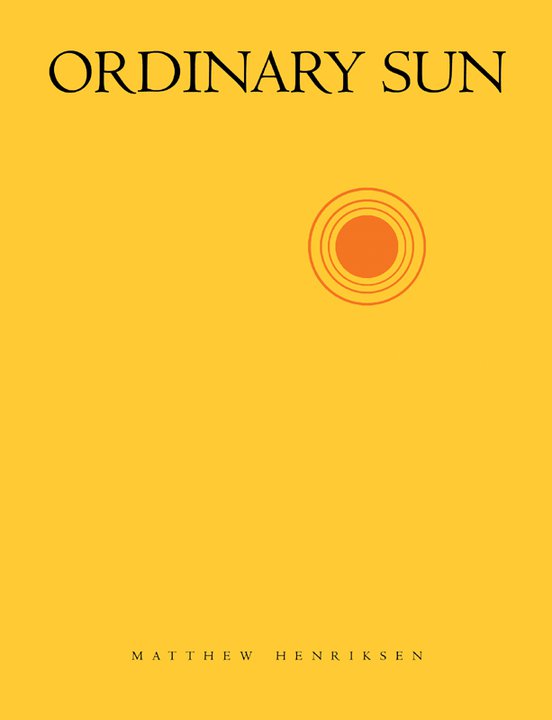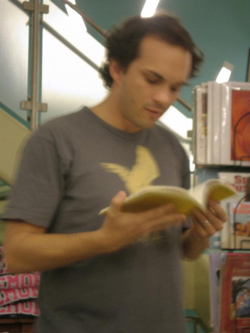
Oridnary Sun (Black Ocean, 2011).

Oridnary Sun (Black Ocean, 2011).
First Book Questionnaire: Matthew Henriksen
1. Does your manuscript bear any relation to a graduate thesis project?
No. I drafted the first few sections of the sequence “Is Holy” as a graduate student, but I didn’t put it in my thesis. The poem as it is in the book doesn’t look anything like the early draft. Then I cast off another manuscript I wrote after graduate school. I think the only poem in Ordinary Sun that survived that manuscript is one of the long sequences, “The New Surrealism,” but that also doesn’t look much like the original version.
2. How do you feel about these poems now that they’ve materialized in book format?
Thinking about old work makes generating new work more complicated. I’m not ashamed of the poems in Ordinary Sun, but I don’t want to write the same book again. On the other hand, I listen too much to responses to the book and wonder if I can match that accomplishment. Ordinary Sun took seven years, most of those years spent hacking, reassembling, and polishing. I can see the intensity of my labor behind those poems, but the new poems come much more easily (though I have far less time to write). Ordinary Sun gives me confidence. Reading the poems now makes me feel like I grew as a listener by writing those poems, but I keep going back to something C.D. Wright said to me, something like, “Congratulations. Now on to the next project.” I want to be a poet like that, continually moving.
3. What was your experience when you began publishing? What challenges did you encounter?
I never thought much about publishing my poems. Before I finished graduate school Adam Clay and I founded Typo and started publishing poetry that we thought should be published, as opposed to what we saw in larger-circulation literary journals. Once I’ve finished a poem I don’t have much personal investment in what happens with it, as opposed to the poems of others, among those I’ve published in Typo and Cannibal, which I intensely want to share. I did send poems as a graduate student to the first online magazines I liked, storySouth, Gutcult, Octopus, Can We Have Our Ball Back? , and Shampoo. When I got to New York I made friends with people who ran small magazines, people who edited magazines came to my readings, and I got solicited. Other than Fence, jubilat, and Chicago Review, I don’t send poems out unless someone asks for them. I like the energy in handmade journals and new online magazines.
4. How, if at all, did chapbooks prepare you for the making of a full-length collection?
My book essentially consists of an assemblage of chapbooks. Many of the sections in the book, however, I had initially composed as a single long piece. The smaller sections helped me push sections into like groups, to cut and expand to create cohesive units. William Heyen’s Lord Dragonfly, which I read in college and continue to revisit, offered a model of sequences orbiting a shared unspoken center. The publication of the earliest section, “Is Holy,” certainly helped me continue with the book, as the response by readers offered unexpected encouragement.
5. How did you shape and order your manuscript?
Putting the poems in order certainly generated the most grief. I’d written many of the poems as part of a non-linear cycle. I had initially imagined a series of lyrical transformations through emotional states. As I spent more time with the book I went with what I saw on the page and focused on how one poem or sequence emerged from the preceding poems. I ended up with a format that alternated between longer poems or sequences and groups of shorter poems titled like chapbooks or chapters. I wanted to arrange the book in a way that would allow a reader to read from cover to cover, although I had not composed the poems to follow any narrative or thematic sequence. When Carrie Olivia Adams and Janaka Stucky at Black Ocean offered edits, they had a similar vision and I think made the book move more quickly from point A to B.
6. Was anyone or anything indispensable in the process of making your debut collection?
Andrea Baker read the manuscript more times than I can count. I feel like she has a partial voice in every poem in the book. Every time I write, I think about her ideas about poetry, which at the core I think twin mine, though we express them and allow them to manifest in our poems quite differently. When I still lived in Brooklyn we started a workshop with Phil Cordelli, Julia Cohen, and Keith Newton. Maybe every poem in Ordinary Sun, except “Corolla in the Midden,” went through at least one workshop with that crew. I hated workshops in graduate school. They felt like circus shows, with many of my peers trying to dance for their futures rather than getting down to the difficult business of poems. But our gang in Brooklyn carried pickaxes (no rubrics, no blue ribbons either). Kate Greenstreet and Jane Gregory helped me shape the book, too, and bolstered my confidence. I am certain I would not have written the book as a book or sent the manuscript to publishers if they had not helped me along. Also, when I had trouble, I turned back to Blake, Stevens, Oppen, Roethke, Hegel’s lectures titled Reason in History, Novalis, and Plato’s Gorgias. Some early versions of the poems had hijacked their lines and distorted them. I often reread those books to regain my focus. Also, I spent a ton of time at the pool table.
7. What is your impression of book contests?
I read books from presses with contests: Ahsahta, Cleveland State, Nightboat, Action, Omnidawn, Bateau and so forth. I like to give small presses money, despite my poverty. On the other hand, I am glad my book landed at a press that has no contests. I am on that side, I guess. But mostly I’m on the side of good poetry, which in a few cases contests support. The problem with contests probably has nothing to do with the contest format, but rather that most people are complete assholes. Thus, most contests are run and judged, according to percentages, by complete assholes. Now if you have Kazim Ali as a publisher and Jean Valentine judging, you eliminate assholes from the contest equation and you end up with Juliet Patterson’s The Truant Lover, a beautiful first book, supported by contest fees from proponents of new poetry who happened to send their manuscripts along. What’s wrong with sending fifteen or twenty dollars as a contribution to an endeavor like that? I suppose you can apply the above mentioned asshole equation to the percentages of people submitting to book contests, but then the problem isn’t that they’re sending money to poetry publishers.
8. How did you learn to navigate the press world?
If we’re going with this metaphor, my ship always sinks. People have carried me along. I’m not much of an operator, unless I’m putting together a reading or making a chapbook for someone else. I’m not much of an operator when it comes to that anymore either. I’m not navigating anything. But I read tons of books from small presses. That’s what I like. I know what the presses publish. In many cases, I know the editors or know poets on the press. I hosted over one hundred readings in New York and have had a hand now in six magazines and a chapbook press, so I have friends who write and publish and tell me about presses. I don’t hear about a press and then analyze its potential for my work; I want to find out what the books are like. I bet that has served me well, though, when it comes to publishing.
9. What aspirations did you have for this book?
I wanted it bound, by me or a publisher I respected, and sent off into the world.
10. How would you describe this work?
Broken light fused into a jagged ball of sound.
11. Do you work primarily on discrete poems, serially, toward a project, with a set of concerns, or otherwise?
I try to write a poem that never ends and then I watch it break down and die. Then I hack the body to pieces and make a new shape. Sometimes I fuse smaller pieces together and sometimes I break larger pieces apart. I sometimes have a “project” but it never seems to make sense to anyone (diagrams, Hegel and Blake quotes, lyric moods labeled with parts of the body and elements of landscape). Inevitably, I take the language generated for the project, hack it up, and make poems of it. I don’t like thematic books (except in a few cases that seem to go well beyond the thematic posturing).
12. Whose poems affect you or your work?
Foremost neither exclusively or inclusively: Alice Notley, C.D. Wright, Shannon Jonas, H.D., Wallace Stevens, George Oppen, Graham Foust, Andrea Baker, Shanxing Wang, William Heyen, Laura Solomon, Allen Grossman, Joyelle McSweeney, Aase Berg, Larry Levis, Adam Clay, Mina Loy, Elizabeth Robinson, Clark Coolidge, Frank Samperi, Theodore Enslin, Carrie Olivia Adams, William Blake, Novalis, Jim Gustafson, Carolyn Guinzio, Paige Ackerson-Kiely, Rachel Moritz, Frank Stanford, Theodore Roethke, John Ashbery, John Berryman, Piero Helzicer, Anna Akhmatova, Landis Everson, James Wright, Brandon Shimoda, Anne Boyer, John Coletti, Paul Celan, Hart Crane, Fanny Howe, Michael Heffernan, Araki Yasusada, Farid Matuk, Ben Mazer, Lily Brown, Tim Van Dyke, Joseph Bradshaw, Jane Gregory, Ryan Flaherty, Andre Breton, Keith Newton, Phil Cordelli, Joseph Massey, Bronwen Tate, Inger Christiansen, Kate Greestreet, Morgan Lucas Schuldt, John Clare, Kevin Holden, Forrest Gander, Melanie Hubbard, Maureen Alsop, Philip Jenks, Cedar Sigo, Jim Behrle, and Geoffrey Hill. These poets have crept into my work and in most cases do so repeatedly. I try to keep expanding that list. Today I could add almost anything from the Poems for the Millennium anthologies; I’m trying to rediscover lost poets or poets who haven’t been lost but I missed—mainly early and pre-twentieth century women and poets in foreign languages from outside the mainstream. Also, everything I read is part of my work. The mind should be expansive in its experiences with language. I save the act of discarding language for my own poems.
13. What are you working on now?
I have a manuscript nearly finished. I hope I spend eight years revising it, though I have a feeling I won’t. I have been cobbling together book reviews again, something I haven’t done in years, and I have a couple mostly finished non-fiction essays, something I have never done. Mostly I am busy teaching five to six classes a semester and tending to my two-year-old. When I have free time, I’m more likely to read than write. I’m somewhere between incubating and ready to explode.
 Matthew Henriksen’s first book, Ordinary Sun emerged from Black Ocean in 2011. Some recent poems appear in Mandorla, Fence, Handsome, Realpoetik, Raleigh Quarterly, Alice Blue Review, Sink Review, and So & So Magazine. A special feature of Frank Stanford’s unpublished poems, fiction, and correspondence selected by Henriksen appears in Fulcrum #7. He co-edits Typo, an online poetry journal, and lives and teaches in the Ozark Mountains.
Matthew Henriksen’s first book, Ordinary Sun emerged from Black Ocean in 2011. Some recent poems appear in Mandorla, Fence, Handsome, Realpoetik, Raleigh Quarterly, Alice Blue Review, Sink Review, and So & So Magazine. A special feature of Frank Stanford’s unpublished poems, fiction, and correspondence selected by Henriksen appears in Fulcrum #7. He co-edits Typo, an online poetry journal, and lives and teaches in the Ozark Mountains.